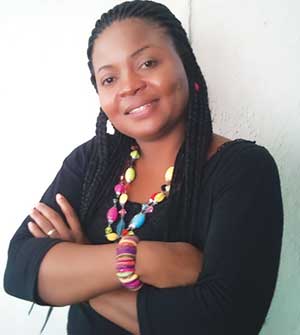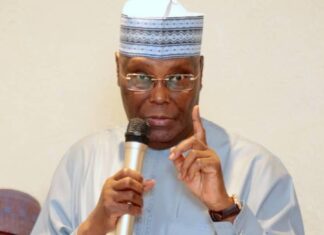Betty Abah, the founder of CEE-HOPE, just completed work on the biography of Prof. Ebele Eko, formerly of UNICAL. In this interview with Assistant Life Editor, TERH AGBEDEH, she talks about her NGO and the biography.
Could you please tell us a bit about why and how you started work on the biography, Mother of Multitudes?
I decided to do a biography on Prof. (Mrs) Ebele Eko, who is my former HOD and lecturer at the University of Calabar (UNICAL) and also my mentor. The decision dates back to 2000, shortly after my graduation from the university. I had heard about her before my admission into UNICAL in 1995, and when I got into school she proved to be exactly what I had heard and even more: a personality almost revered by successions of the students at the English and Literary Studies Department into which I had been admitted. She served as a mother to all, had an imposing and very elegant presence. But much more, she is a first class scholar, poet and literary critic, having written for publications. Yet the most remarkable things about this woman is that her heart is made of pure gold. So many indigent students were beneficiaries of her generosity and many more depressed souls found succour in her office, which doubled as a psychologist’s clinic. In the school environment where, as young persons, you may encounter so many daunting challenges ranging from poverty to harassment by lecturers, she served as an oasis and many naturally gravitated towards her. She was and remains mother to all.
We became friends towards the end of my school year and at about the time of my NYSC in 2000 (15 years ago), I hinted on my interest in documenting her remarkable life. But for several years, she wouldn’t totally give in to the idea, as she would prefer to keep a low profile on her worth or works.
But then, the closer I became to her, the more insistent I became on my resolve to write the biography as I encounter so many people whose lives she had affected and the pure bliss she brings into people’s life. And I thought that as a nation, we should also hold up and celebrate good examples in contrast to the rugged and sometimes ragged musicians and charlatan politicians who occupy public spaces and consciousness and spread bad influence. We have so many unsung heroes and I think we will do well to celebrate such people. I feel so fulfilled to have been able to do this 300-page book on this great woman showcasing her career excellence (she later rose to become deputy vice chancellor of UNICAL school and brought about indelible transformation to the school), her exemplary family life as well as her philanthropic, psychological and spiritual influence on countless people.
You also recently finished work on a magazine titled Hope Inspirer, where do you find the energy to do all the work that you do?
Hope Inspirer is an in-house publication of the Centre for Children’s Health Education, Orientation and Protection (CEE-HOPE), my newly-founded non-governmental organisation (NGO). It is an NGO focused on the rights and welfare of indigent and endangered children. We work in urban slums and rural areas. We have scholarship and empowerment programmes for out-of-school children and vulnerable girls, and we currently work in several impoverished communities across Lagos and Ogun states. We hope to expand to other places in the course of the year. Officially, it is just about a year plus, though I have always worked with children and the youth dating back to when I was 14. No doubt, there is a very urgent need to re-focus the societal lens at empowering the most vulnerable among us for an equitable, prosperous and safe environment. We have the resources as individuals and government, but so many times the willingness is not there. If we don’t bridge the yawning socio-economic gap today by investing in all children in terms of education, health, welfare, instilling the right value and orientation, and general empowerment, then our future remains very much endangered.
Where I find strength to do all these? It is God! I also have a very understanding family and very dutiful staff. I constantly feel a sense of inadequacy because there is so much to be accomplished, but so little resources. I harass my friends all the time to contribute towards alleviating the needs of impoverished children, and some have been very responsive. But I guess some others now see me as a pest. But we are getting there by the grace of God.
What are some of the best moments in your professional life?
There are so many. God has been so good. And, mind you, I count my blessings, not in terms of material acquisition, but in terms of satisfaction and lives touched, though I am still far from ‘being there’. Perhaps just four examples: the day I got a call from the U.S. that I had been selected for the prestigious Alfred Friendly Fellowship. I was over-the-roof with joy. I was at the Golden Gate Restaurant in Ikoyi, Lagos, covering an event as a senior reporter with Tell magazine. That was November 18, 2005 or thereabout. I was among eight young journalists selected for the 2006 set, from eight different countries out of the entries from 41 countries across the world. I was one of three Africans and only black woman (the others, males came from Kenya and Cameroon) and we were to be posted to various newsrooms across the U.S. to report.
The second was having the opportunity to be invited to the U.S. to interview former president Jimmy Carter at the Carter Centre in Atlanta, shortly after the Alfred Friendly Fellowship in 2006, and having to meet General Yakubu Gowon and wife, Victoria (November 2006) there. It was simply exhilarating! The third was having to get my first book, Sound of Broken Chains, out of press and launched on October 6, 2011. The fourth, I would say, was the overwhelming feeling of beholding about 700 children from seven poor neighbourhoods across Lagos crammed into a large hall at the Railway Compound at a party, the official kicking off of CEE-HOPE on December 22, 2013. Those I will never forget, and I am grateful to God for them and all others. It is not of my doing. It is God’s mercy.
How would you say your life experience has made you the person you are today?
I have gone through a lot and I believe I have come out of each experience a better person. I am still pushing, still learning. I try not to be bitter, so my prayers have very fluid passage and so that I can remain focused, and to keep writing and doing better things with my life. You will not always get everybody to like you, but that shouldn’t be your business. You do the best you can. Speak up as objectively as possible when you can and try not to keep enemies. Experiences have made me to be more resolved, more focused but, unfortunately, less trusting of people. I am also learning to be more organised, so I can have better results. But with writers, it’s not always very easy. An inspiration could just strike you and take you away on its tyrannical wings when you should be meeting deadlines. Sometimes those inspirations don’t pay your bills, so those who do can’t understand and they become mad. Well, I sometimes learn not to be too harsh on myself, as I am only human.
What is the most important lesson you’ve learned in your career to date?
I believe that, though people may help in strengthening your value and your vision, the most important factor in excelling and reaching your destiny is your personal drive. God has deposited in you what it takes to excel, but you have to push yourself. Only very few people wake up in the morning wondering about the welfare of others. It’s an individual race. Run, run with the vision and dawn will come. Just run.
How do you maintain a work/life balance?
I rest a lot at home at weekends and once in a while I seek ‘refuge’ in my mentor’s home in Calabar. It’s an arena of perfect bliss, of wisdom and rejuvenation when life gets too harsh. Once in a while, I am also at home with my parents and relations in Benue State.
What do you think is the biggest issue for women in Nigeria, whether in the workplace or elsewhere?
I think the Nigerian society needs to repose more trust in women, especially in the political space. My view is that majority of Nigerians, and that includes women themselves, still revel in the archaic idea that some positions or responsibilities are the exclusive preserve of men. The world has moved beyond that and the earlier we catch up, the better. We can’t make any impressive progress without inclusive development. Women and men must be empowered at the same rate to take up equal responsibilities and when all the energies are harnessed, we can perform optimally as a nation. I am not talking about women usurping power in the home; I believe in harmonious marriages with no forms of abuse. We must come to the understanding that there is nothing wrong with women being governors and even president of Nigeria. It takes brain, and women and men have the same sizes and functioning capacity of brains, so why not? That is why I am also very excited about our girl empowerment programmes comprising scholarship, skills acquisition and leadership trainings. Gender equality is good for everybody.
Are there other Nigerian women whose biographies you would like to write?
Yes, as mentioned above. Also, I would be glad if I can look back, say, 10, 20 years from now and see that I have documented the lives of as many women as possible across Nigeria and indeed Africa whose worthy lives should be read and emulated. I believe that would make a lot of difference.














